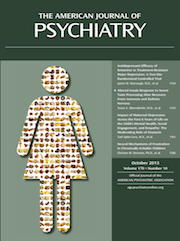Maternal Smoking During Pregnancy and Bipolar Disorder in Offspring
Abstract
Objective
Maternal smoking during pregnancy is associated with a number of adverse externalizing outcomes for offspring from childhood to adulthood. The relationship between maternal smoking and bipolar disorder in offspring, which includes externalizing symptoms among its many manifestations, has not been investigated in depth. The authors examined whether offspring exposed to maternal smoking in utero would be at increased lifetime risk for bipolar disorder after accounting for other factors related to maternal smoking.
Method
Individuals with bipolar disorder (N=79) were ascertained from the birth cohort of the Child Health and Development Study. Case subjects were identified by a combination of clinical, database, and direct mailing sources; all case subjects were directly interviewed and diagnosed using DSM-IV criteria. Comparison subjects (N=654) were matched to case subjects on date of birth (±30 days), sex, membership in the cohort at the time of illness onset, and availability of maternal archived sera.
Results
After adjusting for potential confounders, offspring exposed to in utero maternal smoking exhibited a twofold greater risk for bipolar disorder (odds ratio=2.014, 95% confidence interval=1.48–2.53, p=0.01). The associations were noted primarily among bipolar offspring without psychotic features.
Conclusions
Prenatal tobacco exposure may be one suspected cause of bipolar disorder. However, it will be necessary to account for other unmeasured familial factors before causal teratogenic effects can be suggested.



